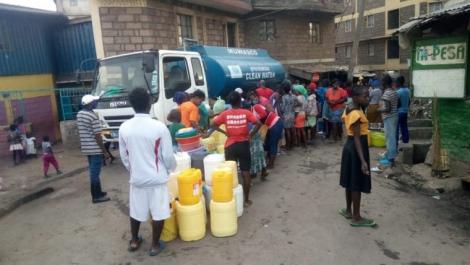Finding a house or apartment to rent in towns and cities such as Nairobi has become a challenge for many tenants, not least because of identifiable challenges that crop up early on.
Even among those already settled, many are moving out and looking for new places partly thanks to challenges that complicate their lives, as opposed to their homes being safe, comfortable and peaceful havens.
The Covid-19 pandemic and its effect on businesses and the economy has, undoubtedly, played a role in the heightened activity as some residents move to cheaper places as a way of ensuring they stay afloat amid widespread losses of income.
Some of the factors, however, have been in play long before the pandemic and are cited by many Kenyans among the key considerations they make when house hunting. For residents of Nairobi, for instance, the lack of running water is a deal-breaker for many tenants.
The water problem cuts across several city estates, but for many house-hunters, seeing large jerrycans and water tanks outside homes is a major red flag. Vehicles selling clean water also send potential tenants running in the other direction, as they offer an early glimpse into the situation.
Without consistent running water, residents in some areas spend a lot of time and energy filling up containers with water to store in residential estates such as Nyayo Highrise located along Mbagathi Way.
Peter Ndirang’u, an experienced property agent based in the estate, told Kenyans.co.ke that several clients had chosen to live elsewhere after observing the hustle residents go through.
“Water is a big issue for many people, in fact the biggest. Here it’s bad because when you walk through the gate, the first thing you see is mkokotenis (handcarts) full of water containers being sold.
“So when you have to explain to a client that they will have to wake up every Saturday to fill tanks and containers because they only have a window of a few hours when water is available, sometimes they decided to look elsewhere,” he stated.
READ ALSO: Warning Signs To Note When Buying A House In Kenya
Another common red flag cited by house hunters in Nairobi was the presence of loud churches, clubs and bars close to homes.
This has been a challenge for residents of several city estates, including Kilimani, Umoja, Mlolongo and Kayole among others.
When looking for houses, many Kenyans are also keen on natural light and shy away from dark houses.
The trend of several high-rise buildings close to each other in estates such as Pipeline in Nairobi has made this a common issue.
Other warning signs cited by house hunters were lack of privacy and shared utility bills, including power and electricity.
Most residents prefer to be aware of their consumption of water and electricity to be billed individually, as opposed to the common situation in some areas where all tenants contribute towards the cost of paying utilities.
Security is another key consideration for prospective tenants, some of whom seek to establish the proximity of a police station or chief’s camp.One Nairobi resident noted that, when house hunting, she was wary of apartments or buildings she could walk into without offering any sort of identification or being stopped at the entrance.
Other factors that contribute to how Nairobians pick houses are matters of preference; as some, for example, don’t like patterned tiles, multi-coloured walls, cramped bathrooms and toilets among other features common in houses across the city.
Landlords, agents and caretakers’ relationships with tenants also plays a big role in tenants’ decisions. Importantly, many prefer to deal with sober-minded individuals and are put off by cases of harassment over various disputes.
Peter told Kenyans.co.ke that judging from rental activity in Lang’ata, Nairobi West and South C areas during the Covid-19 pandemic, lifestyles and budgets had superseded other factors.
“So many people have moved from what people view as middle-class estates like South C and West during this time, so many. Some of them are moving to city outskirts like Ruiru, Rongai and others are going to areas with decent houses that are comparatively cheaper like Komarock, he revealed.
Source: KENYANS.CO.KE




